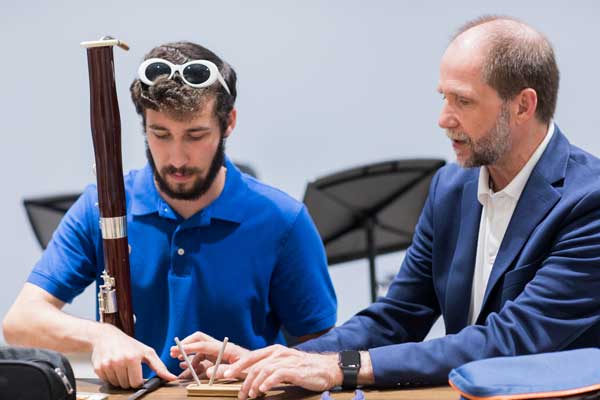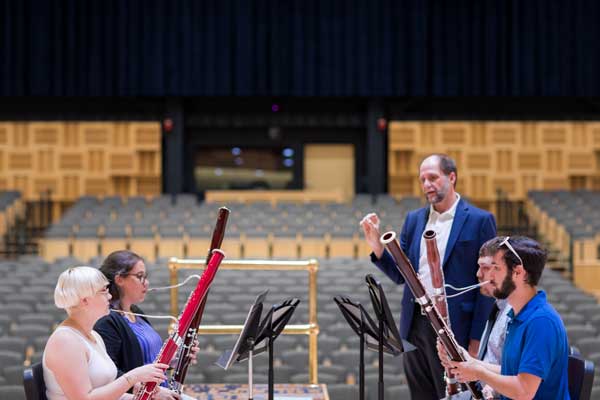Nazareth is ideal for music education
Our eclectic approach ensures that you are capable of incorporating different methodologies into your teaching, to meet the needs of all learners — such as Orff Schulwerk, Kodály Method, Dalcroze Eurhythmics, Comprehensive Musicianship, Music Learning Theory and more. You will learn from level-certified instructors in many of these approaches.
This breadth allows you to head to the classroom with a helpful array of approaches, understandings, and pedagogical tools to best support all students.
Our curriculum provides opportunities outside of class in area ensembles, leadership in our nationally recognized local student chapter of C-NAfME & C-NYSSMA, participation in area workshops and in-services, leading events on campus and in the community, as well as getting involved in other organizations on campus. Some of our music education students study abroad and pursue work abroad as well. Some music education students are active collegiate athletes as well.
I encourage students to stay in touch
It’s important to me to remain connected to our students, even after they leave the classroom and the school. I remain “on call” for them for Zoom meet-ups or texting in order to provide additional support, assistance, and to celebrate their accomplishments. Music education alumni know that they can reach out to me. Often, we’ll meet at an area coffee shop to talk and for me to learn more about their work and aspirations after they graduate.
Proud of our students and national recognition
Our collegiate chapter of the National Association for Music Education (C-NAfME) has received multiple Chapter of Excellence Awards from the national association (NAfME). This endorsement of the success of our student leaders and members speaks clearly about the caliber of our degree program and the opportunities that we provide to our future music educators.
Go further in the Orff Schulwerk process
All music teachers should consider advanced “levels-study” in the Orff Schulwerk process. We are a proud partner with the Greater Rochester American Orff Schulwerk Association (GRAOSA) and welcome music educators to complete levels training during our annual Orff Schulwerk Summer Music Institute.
Having completed levels courses in this approach was a real game-changer for me. It also helped me to be a better teacher to students of all ages and subject areas.
Favorite quote about teaching
“Teaching begins when the student has a problem. All else is simply instruction.” — Émile Jaques-Dalcroze, a Swiss composer, musician, and music educator
Fun facts
- Dr. Koster has fully embraced lake culture and spends time in Kenora, Ontario, Canada with his family at a 100-year-old lakeside cottage.
- In addition to music, Dr. Koster enjoys playing tennis and volleyball. He looks forward to opportunities when Dr. Reef (associate professor in music theory) and he can play a few doubles matches with interested music students.
- When travel is possible, he enjoys applying his knowledge of French, German, and Arabic, provided locals are willing to be patient with his basic language skills.
Student Perspective
“Dr. Koster is the professor who will always be in your corner, making sure you receive all the support you need to be successful in all you pursue. From class, to student teaching, to post-graduation, and into your journey as a music educator, Dr. Koster has a wealth of knowledge and will be there for you to help you to be your best.
Nazareth’s music education program provided a wonderful community to learn and grow. The support of my professors and peers as we explored each other's ideas and the ever-changing world of education helped me to become the educator I am today.”
— Hannah Komar ’23 (music education degree, specializing in voice, with a minor in music history), music teacher, Fayetteville-Manlius (NY) School District.

Bassoon Studio Class: Prof. Koster works with music major Dominic Vesely during their weekly class, where they were making and adjusting their bassoon reeds.
School of Music Responsibilities
- Program Director for Graduate Music Education
- Orientation to Music Education
- Teaching Music in the Elementary School
- Issues in Elementary Music Teaching
- Music Education in the Inclusive Classroom
- Graduate Capstone Seminar
- Applied Bassoon and Contrabassoon
- Orff Schulwerk Institute
- Wilmot Wind Quintet

Honors
- Paul and Gertrude Mathews Prize for Excellence in Teaching
- High Flyer Award for Excellence in the Scholarship of Teaching
- Sigma Phi Zeta music honor society
- Pi Kappa Lambda music honor society